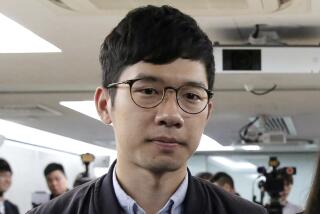Cuba Wants Life Terms for 10 Dissidents, Activist Says
- Share via
HAVANA — Cuba is seeking life sentences for at least 10 dissidents jailed in the largest crackdown on government opposition in years, the island’s best known rights activist said Wednesday.
The government has arrested 78 dissidents since March 18, accusing them of working with U.S. diplomats to subvert Fidel Castro’s rule and being mercenaries in the pay of Washington.
Prosecutors are seeking life sentences for 10 of them, including opposition political leaders Osvaldo Alfonso Valdes and Hector Palacios, independent journalist Ricardo Gonzalez and dissident economist Marta Beatriz Roque, human-rights activist Elizardo Sanchez said.
The trials, which are expected to be quick, are scheduled to begin today in at least four different Havana courthouses, he said.
“This is a bad year for Cuba,” said Sanchez, whose group regularly reports on the island’s human-rights situation and political prisoners to international organizations.
A three-page list compiled by Sanchez’s Cuban Commission on Human Rights and National Reconciliation listed recommended sentences ranging from 15 years to life for the defendants.
The information was gathered from and confirmed by relatives of each defendant, Sanchez said.
According to the list, prosecutors are seeking 20 years for Raul Rivero, the best known of Cuba’s independent journalists and a delegate to the regional Inter-American Press Assn.
The Cuban government has provided no information about the trials and it is unknown if international journalists will be granted court access.
Authorities here have accused those arrested of being traitors.
In Washington, Robert Zimmerman, spokesman for the State Department’s Latin America bureau, labeled the trials a travesty.
He called the plan to try the dissidents “an appalling act of intimidation against those seeking freedom and democratic change on the island.”
The crackdown began when Cuban officials criticized the head of the American mission in Havana, James Cason, for his active support of the island’s opposition.
The roundup of opposition members followed several years of relative government tolerance of dissent. During that time, the opposition grew stronger, more organized and more daring.
Gonzalez launched the island’s first independent general interest magazine. Other activists gathered signatures for an initiative seeking a referendum on new laws guaranteeing civil rights, such as freedom of speech and assembly.
Among those arrested were independent journalists, directors of nongovernmental libraries, members of opposition political parties and volunteers for the Varela Project, the pro-democracy petition drive.
More to Read
Sign up for Essential California
The most important California stories and recommendations in your inbox every morning.
You may occasionally receive promotional content from the Los Angeles Times.













